Energy Integration - Now or Never
Adelina Marini, March 18, 2015
 In the spirit of the forceful personality split of the most energy dependent EU member states which, like Bulgaria, state their strong love for the Russian culture but in the same time their as strong hatred for its authoritarian rule, in Brussels the atmosphere is identical. On 19-23 March there is a Tchaikovsky festival which coincides with the spring EU summit during which the leaders of the 28 member states will discuss for the first time the European Commission proposal for the creation of an energy union. But while Tchaikovsky's music is gentle and inspiring, the discussions on the first day of the two-day summit on 19-20 March are expected to be quite heated. And although the strategy European Commission Vice President Maros Sefcovic and energy and climate Commissioner Miguel Arias Canete presented is too far from the ambition the PR is trying to impose on it, still, there are some elements in it that are creating tensions between the member states.
In the spirit of the forceful personality split of the most energy dependent EU member states which, like Bulgaria, state their strong love for the Russian culture but in the same time their as strong hatred for its authoritarian rule, in Brussels the atmosphere is identical. On 19-23 March there is a Tchaikovsky festival which coincides with the spring EU summit during which the leaders of the 28 member states will discuss for the first time the European Commission proposal for the creation of an energy union. But while Tchaikovsky's music is gentle and inspiring, the discussions on the first day of the two-day summit on 19-20 March are expected to be quite heated. And although the strategy European Commission Vice President Maros Sefcovic and energy and climate Commissioner Miguel Arias Canete presented is too far from the ambition the PR is trying to impose on it, still, there are some elements in it that are creating tensions between the member states.
All contracts under European Commission scrutiny
The most disputed issue that the leaders are expected to discuss in the late afternoon on Thursday is the proposal the Commission to check all the contracts the member states sign with third countries no matter if they are intergovernmental or with private companies. It is precisely the contracts with private companies that are causing the rift. European Council President Donald Tusk, though, is determined to ensure the approval of the 28 leaders for the idea of the Commission that not only the member states but the private companies as well should ensure that all contracts with external suppliers will be in line with the European legislation. A major priority for the EU needs to be its energy security. Donald Tusk, who is the author of the idea for an energy union in his capacity as prime minister of Poland, does not see a single rational argument why any country would like to sign a contract that is illegal or against the interests of the common European energy security, an EU source has revealed.
It is crucial, when negotiating a contract, to remove clauses that make the creation of a real and functioning energy market impossible. Such a clause is the ban on re-export which practically fragments the common market. According to the same senior EU official, there is one supplier, currently investigated by the European Commission, who imposes such clauses. The source did not name the supplier but currently the Commission is investigating the Russian state-owned company Gazprom for violation of the competition rules. Mr Tusk is convinced that there is no good argument in support of allowing contracts that are against the European interests. There are already mechanisms for protection, like for instance for the deliveries of uranium. The same mechanisms can be applied for the gas deliveries as well.
Another clause that has to be removed from bilateral contracts is "take it or leave". Transparency will be a great step in the direction of building a functioning energy market. This will increase the bargaining power of the member states, the European Council chief is convinced. The problem is, however, that at the moment there are around 300 contracts for gas deliveries which are signed for more than a year. Around a hundred of them are signed for 20 or 30 years and only 30-40 are expiring in a year. This means that even if the European leaders would adopt the Commission idea for transparency of the contracts, the effect will be felt in 20 years at best. During the first presentation of the strategy on the energy union Maros Sefcovic admitted that the renegotiation of already signed contracts is very hard.
According Meglena Kuneva, deputy prime minister of Bulgaria on coordination of European policies, the countries that have smaller markets and to which the energy union could serve as a shield, want their contracts to be scrutinised by the Commission. Resistance comes, according to well informed sources, from the bigger countries. Bulgaria firmly supports the Commission to take an active part in the scrutiny of all kinds of contracts - both private and intergovernmental. Ms Kuneva said that she raised this issue very seriously during the General Affairs Council on 17 March which prepared the draft conclusions for the EU summit on Thursday and Friday. She informed her colleagues that Bulgaria went through a similar review for the South Stream. Bulgaria strictly respected the EU rules and relied on the Commission as a fair evaluator and a broker for which it paid a high price. In her words, she received the support of the first vice president of the Commission, Frans Timmermans, who assured that the member states can rely on the Commission to respect commercial secrets because so far there have been no suspicions in its work.
"Our position is absolutely relevant for the simple reason that, ultimately, we are allowing our budgets to be assessed in advance which, I think, is something much more inmost than commercial contracts which can, indeed, break the balance", added Meglena Kuneva, a former commissioner for consumer protection. Despite her conviction in the need of transparency of the gas contracts with external suppliers, she said that she expects debates on the issue during the summit. According to her, transparency will create real competition. At the moment, Bulgaria's gas is three times more expensive 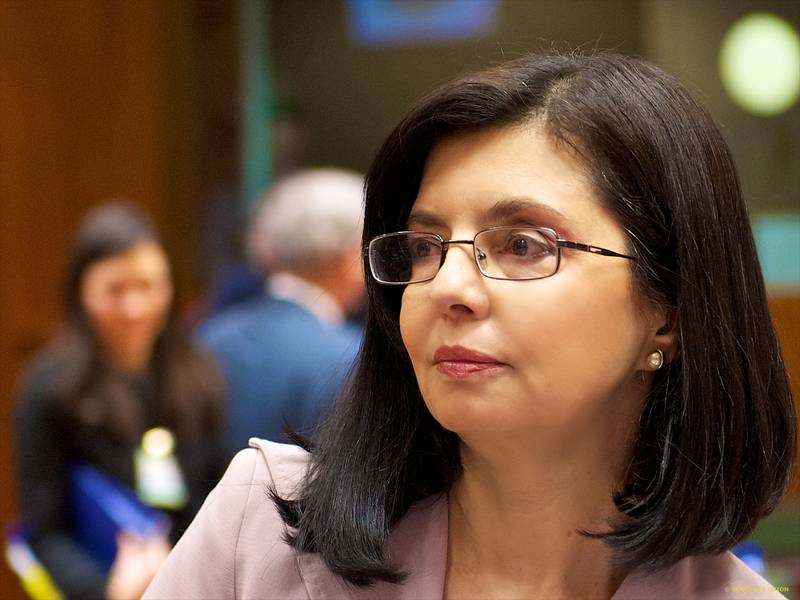 than other economies'. That is why, she said, this is not about giving more powers to the Commission but about creating real cohesion and level playing field for competition for all.
than other economies'. That is why, she said, this is not about giving more powers to the Commission but about creating real cohesion and level playing field for competition for all.
Upon Bulgaria's insistence, in the draft conclusions has been inserted a text that takes into account the energy security of South-Eastern Europe on the basis of the conclusions of the high level group which met for the first time in Sofia on 9 February. In it took part representatives of Austria, Bulgaria, Croatia, Greece, Hungary, Italy, Romania, Slovenia and Slovakia as well as Maros Sefcovic and Miguel Arias Canete. The objective of the group is to create a map of the missing infrastructure, to accelerate its construction and to improve the security of gas deliveries. Each member state from the region should have access to at least three different sources of gas, the representatives of the group demanded in Sofia.
This European Council puts an end to Donald Tusk's ambition for "diet" summits and short conclusions. This means that there will be no more efforts to finish the meeting earlier. According to an EU source, the leaders will discuss as long as it takes to reach an agreement on all the points on the agenda. And some of them are really hard.
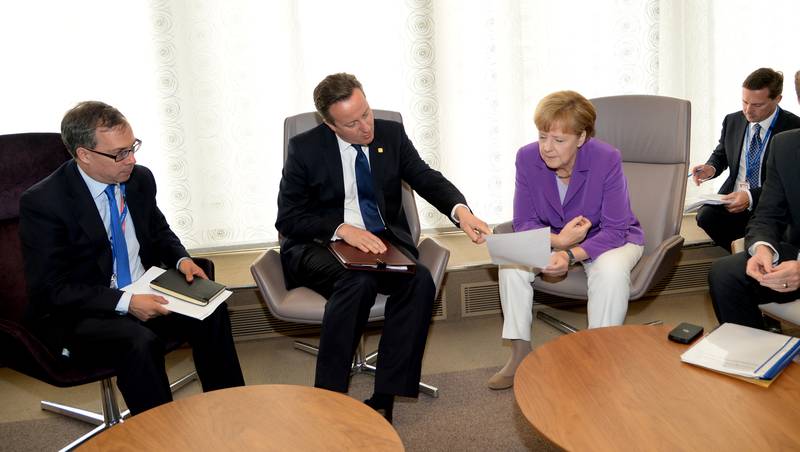 David Cameron, Angela Merkel | © Council of the EU
David Cameron, Angela Merkel | © Council of the EU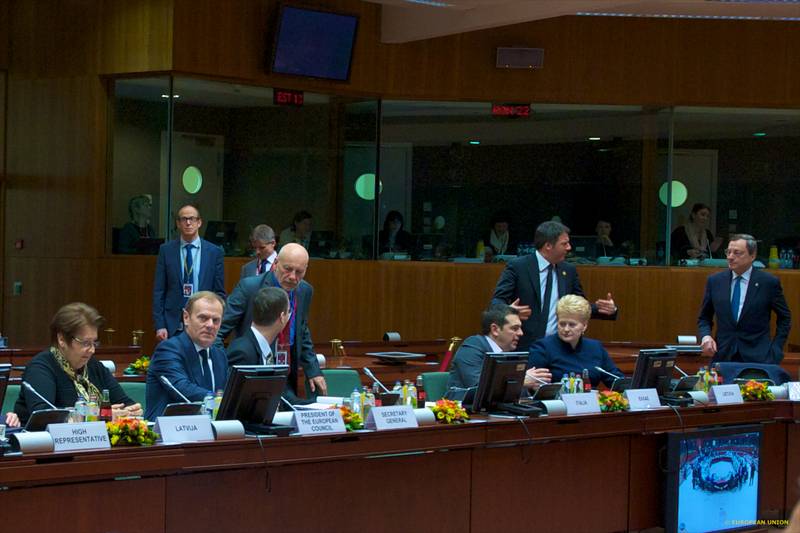 | © Council of the EU
| © Council of the EU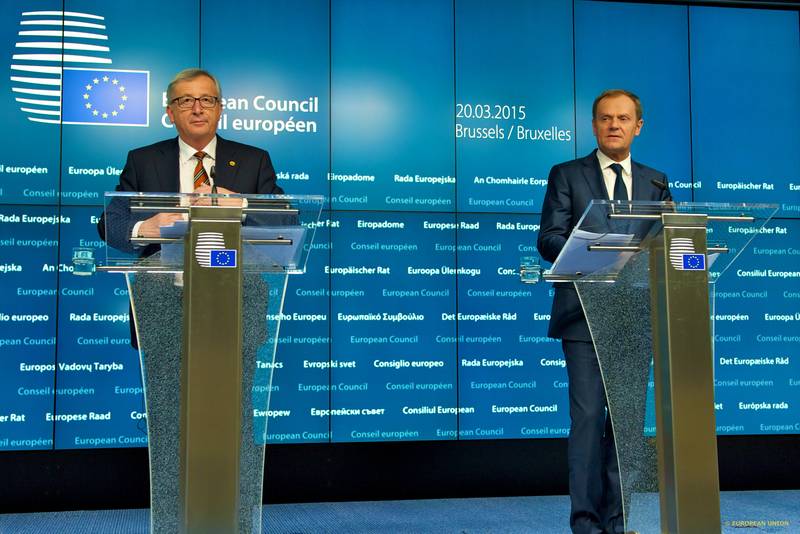 Jean-Claude Juncker, Donald Tusk | © Council of the EU
Jean-Claude Juncker, Donald Tusk | © Council of the EU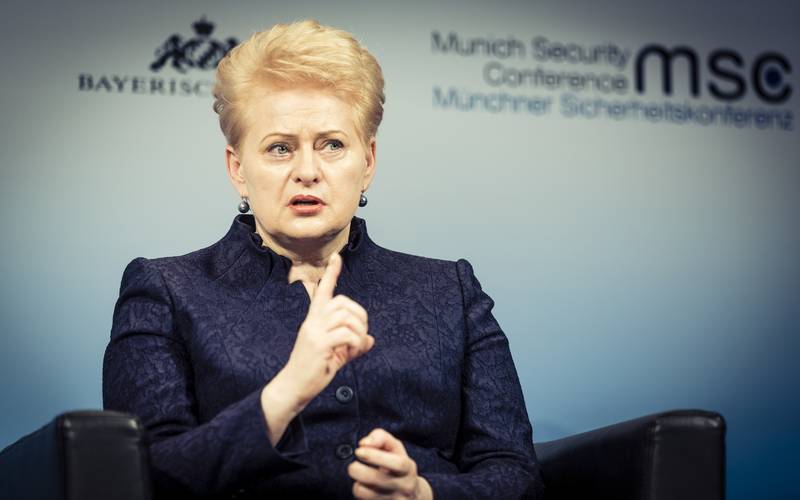 Dalia Grybauskaite | © MSC/Koerner
Dalia Grybauskaite | © MSC/Koerner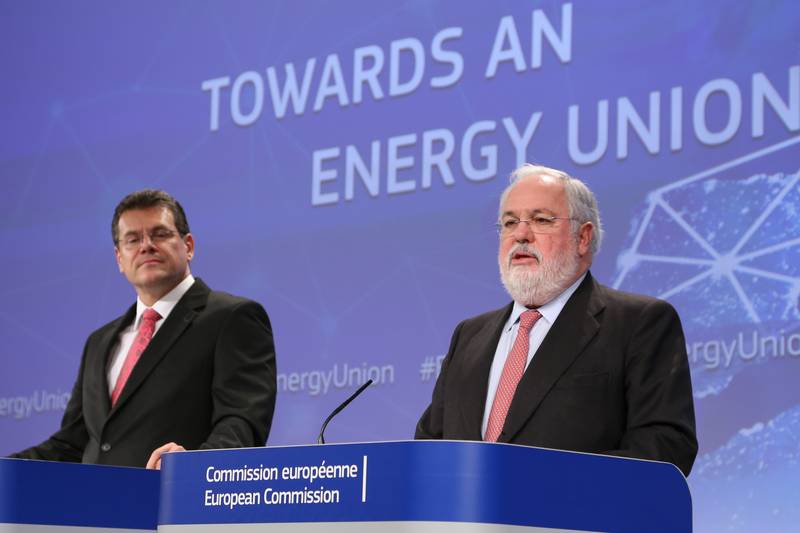 Maros Sefcovic, Miguel Arias Canete | © European Commission
Maros Sefcovic, Miguel Arias Canete | © European Commission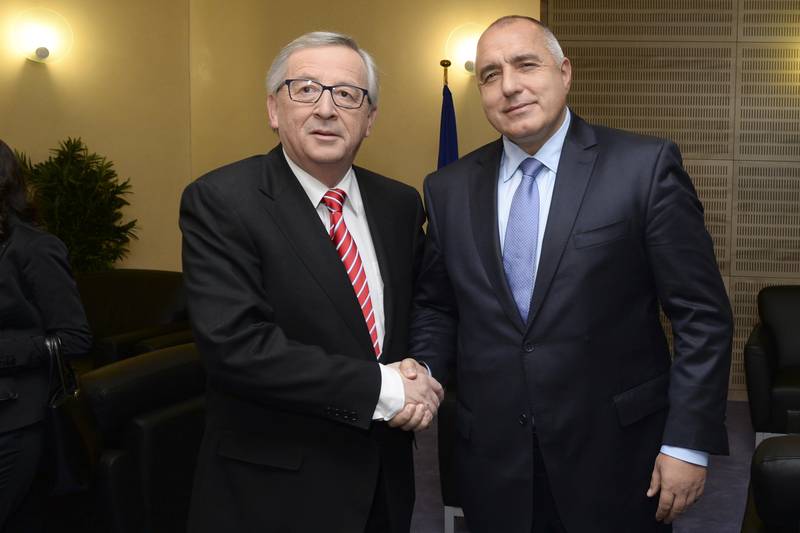 Jean-Claude Juncker, Boyko Borissov | © European Commission
Jean-Claude Juncker, Boyko Borissov | © European Commission